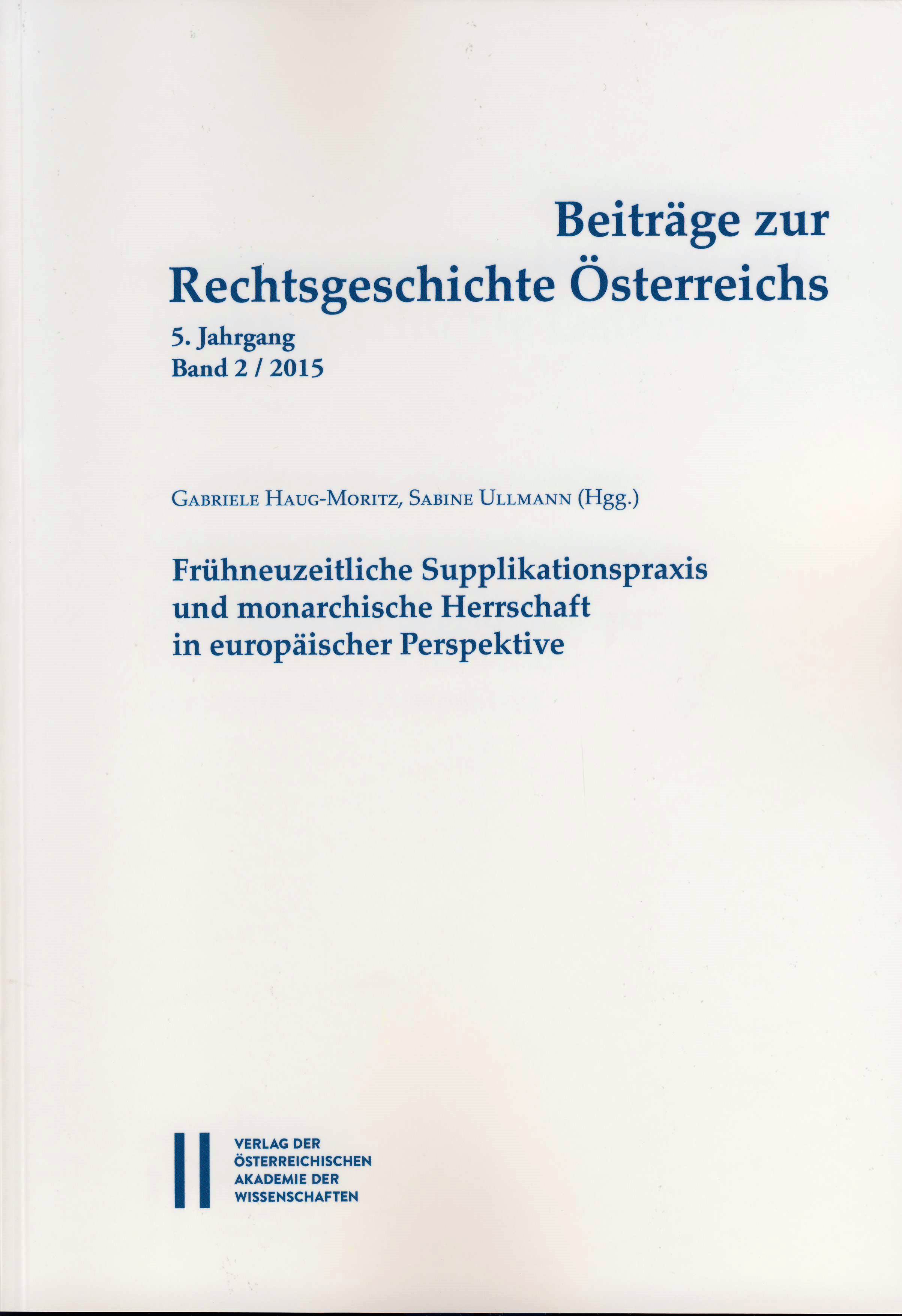Gabriele HAUG-MORITZ - Sabine ULLMANN (Hgg.)
Beiträge zur Rechtsgeschichte Österreichs 5. Jahrgang Band 2 / 2015
Frühneuzeitliche Supplikationspraxis und monarchische Herrschaft in europäischer Perspektive
Birgit Emich
S. 325 - 348
doi:
10.1553/BRGOE2015-2s325
Verlag der Österreichischen Akademie der Wissenschaften
Abstract:
This paper addresses the Early Modern papacy’s system of dealing with supplications (Suppliken). In the first part, the paper gives an overview of the papal stance towards supplications and points out why the papacy can justly be called a ‘grace machine’. In a second step, these general observations are followed by a specific analysis which takes a look inside the grace machine itself, so to speak, by reviewing sample supplications and briefs of grace (Gratialbreven) concerning the province of Ferrara during the pontificate of Pope Paul V (1605–1621). These sources shed light on the Pope’s role as territorial prince and on Rome’s stance towards the subjects’ petitionary letters in general. As it turns out, the dual character of the papacy – with its secular and spiritual spheres – shaped the policy towards supplications within the Papal States profoundly. Even though the subjects’ supplications were addressed to the Pope as the head of the Catholic Church, they also touched on issues of public administration, which in turn rendered those letters a concern of Rome’s bureaucratic apparatus. At the same time, however, since the cardinalnephew acted as the agent of papal grace, acts of grace of all kinds could easily be portrayed as acts of favor granted by the ruling family in order to commit the recipient to loyalty and allegiance. Thus, supplications addressed to the Pope had not only a religious-ecclesiastical dimension, but were also a political medium of communication between the ruler and his subjects.
Roman Curia, subjects’ supplications, Early Modern papacy, Papal States, Penitentiary, papal briefs of grace, grace and favor, Pope Paul V, Ferrara
Published Online:
2015/12/11 12:44:53
Object Identifier:
0xc1aa5576 0x00329a47
Rights:All rights reserved.For questions regarding copyright and copies please contact us by email.
Gabriele HAUG-MORITZ, Graz/Sabine ULLMANN, Eichstätt
Frühneuzeitliche Supplikationspraxis und monarchische Herrschaft
in europäischer Perspektive: Einleitung
Ulrich HAUSMANN, Eichstätt
Sich ahn höhern Orten beclagen unnd das kayserliche Recht darüber ahnrueffen
Herkunft, Zielsetzung und Handlungsstrategie supplizierender Untertanen am
Reichshofrat Kaiser Rudolfs II. (1576–1612) unter Einbeziehung
der Überlieferung süddeutscher Archive
Thomas SCHREIBER, Graz
Die Ausübung kaiserlicher Gnadengewalt durch den Reichshofrat
Untertanensuppliken am Reichshofrat Kaiser Rudolfs II. (1576–1612)
Gunter VASOLD, Graz
Vom „Allerunderthenigsten Anruffen“ zum analytischen Abrufen
Ein Werkzeug zur kooperativen Erfassung, Verwaltung und Analyse von
Untertanensuppliken
Tobias SCHENK, Göttingen
Das frühneuzeitliche Kaisertum – ein Faktor der Alltagsgeschichte?
Überlegungen auf Grundlage der Reichshofratsakten
Eva ORTLIEB, Graz
Untertanensuppliken am Reichshofrat Kaiser Karls V.
Christian LACKNER, Wien
„Fiat (ut petitur).“ Zur Erledigung von Suppliken in der Hofkanzlei König
Maximilians I. in den 1490er Jahren
Irene KUBISKA-SCHARL, Wien/Michael PÖLZL, Wien
„Formalisierte Gnade“. Das Supplikationswesen am Wiener Hof im 18. Jahrhundert
am Beispiel supplizierender Reichshofräte
Stefan BRAKENSIEK, Duisburg-Essen
Supplikation als kommunikative Herrschaftstechnik in zusammengesetzten
Monarchien
Birgit EMICH, Erlangen-Nürnberg
Gnadenmaschine Papsttum. Das römische Supplikenwesen zwischen
Barmherzigkeit und Bürokratie
Lothar SCHILLING, Augsburg
Gnadengewalt und höchstrichterliche Gewalt im frühneuzeitlichen Frankreich
(ca. 1550 bis ca. 1715)
…




 Home
Home
 Print
Print
 References
References
 Share
Share
